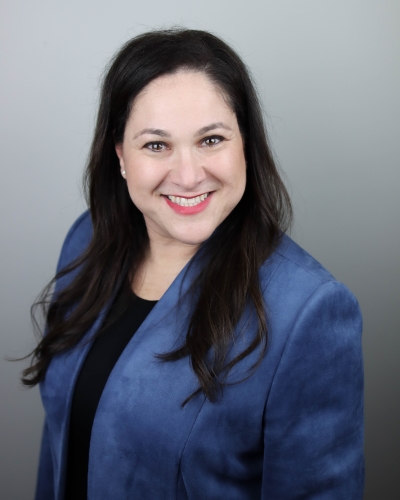Prof. Emily Block’s new book showcases the power of business in rebuilding post-conflict and other challenging communities
After disasters strike or a conflict takes its toll on a region and its people, business can act as a key and innovative force, one that reduces poverty and enables reconciliation. That’s one of the main themes that runs through a new book titled Business on the Edge: How to Turn a Profit and Improve Lives in the World’s Toughest Places.
Slated to come out on July 16, the book is written by Emily Block — an associate professor of strategy, entrepreneurship and management and the George Cormie Chair in Management at the Alberta School of Business — and Viva Ona Bartkus, a professor emeritus of management at the University of Notre Dame.
In part, Business on the Edge showcases the results of Block and Bartkus’ award-winning Business on the Frontlines course. This service learning program involves students and faculty members heading to a post-conflict area and finding ways to aid local partners to foster safety and prosperity by bringing in private sector concepts and funding. Since its start, the program has seen students and staff establish around 80 different projects around the world, notably in sub-Saharan African, Southeast Asian and Central- and-South American countries.
“This book was kind of the culmination of all of the lessons learned over our 15 more years in working with partners around the world on using business-related skills to solve non-business-related problems,” Block says.
Skills acquired over a lifetime
 In 2008, Block began working as an instructor at the University of Notre Dame, then accepted an assistant professor position after finishing her PhD at the University of Illinois at Urbana-Champaign. While at the school she met Bartkus — who was also teaching there — who had founded the Business on the Frontlines program, which Block helped grow. It became successful and popular quite quickly. “We had people applying for the MBA program at Notre Dame for the opportunity to apply to our course. It was really quite groundbreaking, both in terms of its popularity and how it brought business students to work with humanitarian organizations in immersive field settings,” Block says.
In 2008, Block began working as an instructor at the University of Notre Dame, then accepted an assistant professor position after finishing her PhD at the University of Illinois at Urbana-Champaign. While at the school she met Bartkus — who was also teaching there — who had founded the Business on the Frontlines program, which Block helped grow. It became successful and popular quite quickly. “We had people applying for the MBA program at Notre Dame for the opportunity to apply to our course. It was really quite groundbreaking, both in terms of its popularity and how it brought business students to work with humanitarian organizations in immersive field settings,” Block says.
Block grew up in a family that had a “strong culture and orientation toward service,” she says. She has seven siblings and step-siblings. Many of them got involved doing volunteer work and other forms of social service. Throughout her career, Block was frequently thinking about ways in which business could contribute meaningfully to conversations around resolving grand challenges, she says.
“Being able to use the skills that I’ve acquired over my lifetime to have an impact was really attractive to me,” she says. “It’s been amazing to see business gaining a seat at the table and contributing its insights to some of the toughest problems in the world.”
After Block came to the U of A in 2016, she established the school’s version of the program. Though Bartkus has since retired, Notre Dame’s program continues to run, and other universities have created similar programs.
Peace and Prosperity
Providing jobs aids in economic prosperity which, in turn, reduces the rates at which people turn to crime or violence to make ends meet, Block says. “Nothing stops a bullet like a job,” she says.
Block’s book highlights some examples of the way that business, in collaboration with humanitarian partners, can illuminate new avenues for development. For instance, she and her team partnered with World Vision Philippines to fight human trafficking.
After running a value chain analysis, Block and her team suggested that investing in job creation — notably in fishing and construction — could disrupt the human trafficking rings by drawing away low-level members.
In another effort, Block and her team worked with an organization in Colombia that focuses on disarmament, integration and rehabilitation of former members of the Revolutionary Armed Forces of Colombia (FARC). Fostering economic initiatives enabled the former FARC members to be better integrated with the communities around them, she says.
Opportunities to be Had
The local partners play an incredibly important role, she says. It’s essential to form a strong bond with them, co-producing outcomes that utilize their knowledge of local languages, religions, affiliations, politics, etc. These environments are “incredibly complex,” she says.
“We definitely don't want to overstate our activities. Our partners are key to this work, and we work very, very closely with them.”
This year, the U of A’s Business on the Frontlines program will head to the Philippines once again this spring. Block notes that the book — which analyzes more than a decade of findings from on-the-ground work — aims to show business leaders and practitioners that there are opportunities to foster peace and economic prosperity through investing in these frontline environments.
“In reality, businesses are rarely in the room, right? There are governments and non-government organizations, and religious institutions,” Block says. “We’re trying to encourage these unconventional partnerships and these approaches.”
Subscribe to UAlberta Business
Become part of our community. Get the latest news and event information from the Alberta School of Business in your inbox every month.